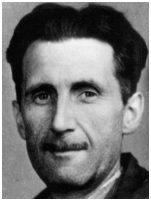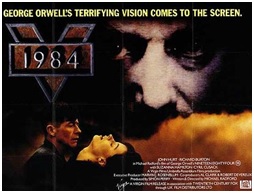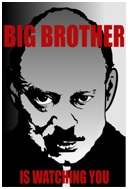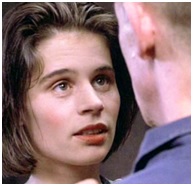|
 |
|
 |
|
|
||
Nineteen Eighty-Four - Success and Leadership
Nineteen Eighty-Four (1949)
Written by the Englishman, George Orwell (1903-50), pictured right, about what the world would be like in 1984. Like his other famous book, Animal Farm, it warned of the dangers of totalitarian (or dictatorial) government (now described as “Orwellian”).
Fun facts
Key characters Winston Smith, a 39-year-old intellectual and rebel against the ruling Party. Julia, his lover. O’Brien, powerful member of the Party. Big Brother, perceived ruler of Oceania.
The story The world in 1984 is divided into three dictatorships:
They all possess nuclear weapons and are continually at war with each other. Oceania is ruled by the Party, led by the omniscient image of Big Brother. Rebellious thinking (“thought crime”) is the worst crime and is controlled by the Thought Police. Apart from the small minority of trained Party members, people are poor and slave-like “proles” (or proletarians). Winston Smith works in London (in Oceania) as a junior official of the Party in the Ministry of Truth where he re-writes news stories to comply with Party propaganda. He hates the Party and its violent opposition to the Brotherhood, a resistance movement, led by Emmanuel Goldstein. Winston spends his evenings wandering through the poor, prole districts and illegally writing a diary with his rebellious thoughts. He is married but has an illegal affair with his beautiful work colleague and Party supporter, Julia. A senior Party member, O’Brien, invites Winston to his luxurious apartment, saying he is a secret supporter of the Brotherhood. But Winston and Julia are then arrested by the Thought Police. Winston and Julia are taken to the Ministry of Love, where O’Brien tortures and
brainwashes them, revealing that his membership of the Brotherhood had been a lie to catch
them. Eventually O'Brien sends Winston to the dreaded Room 101, where he straps onto his head a cage of rats (his biggest fear). As O’Brien prepares to allow the rats to eat his face, he cracks and pleads with him to torture Julia, not him. On his release he becomes a self-pitying alcoholic, because his betrayal of Julia, the person he loved most, has destroyed his spirit and self-respect. Winston is no longer interested in Julia, accepts the Party completely, loves Big Brother and believes that two plus two equals five.
Lessons for success and leadership
1. Be true to yourself Winston’s spirit is broken because he is forced to abandon his principles of:
2. Love liberty 1984 shows the horrors of dictatorship, epitomized by
Truth is for the Party to decide, not individuals like Winston. The Party's aim is to control people’s minds through:
3. Love must be true As a Party supporter, Julia:
But Winston:
4. Live for today but don’t forget tomorrow Julia’s optimistic love of life (however amoral) contrasts with Winston’s pessimism. “We are the dead”, he says. “We’re not dead yet”, she replies, urging him to enjoy her beautiful body. But Winston:
When history stops, he says: “Nothing exists except an endless present in which the Party is always right”. Julia (Suzanna Hamilton) is pictured right with Winston (John Hurt) in the film.
5. Absolute power is awful George Orwell gives O’Brien an Irish name as an attack on the Roman Catholic Church’s absolute power. O’Brien’s brutality is shown in his nightmarish vision of the future: “a boot stamping on a human face – for ever”. The Party abuses its power - its leading officials (like O’Brien) are rich but the people are poor and cities are crumbling. O'Brien (Richard Burton) is pictured right in the film
6. Love learning and wisdom Winston hates the Party for its suppression of truth and learning This is reflected in the book’s opening sentence: “It was a bright, cold day in April and the clocks were striking thirteen”.
7. Dealing with contradiction and paradox At work Winston is forced to practise “doublethink”, defined as “the power of holding two contradictory beliefs in one’s mind, simultaneously, and accepting both of
them”. Doublethink:
Winston (John Hurt) is pictured right in the film.
8. Fight for your principles The resistance group, the Brotherhood, bravely opposes the Party.
9. Love nature Winston loves the beautiful English countryside.
Key quotes on government and freedom Big Brother is Watching You, Party slogan. War is peace. Freedom is slavery. Ignorance is strength, Party slogan. Freedom is the freedom to say that two plus two makes four. If that is granted, all else follows, Winston Smith.
Key quotes on the past, present and future Who controls the past controls the future. Who controls the present controls the past, Party slogan If you want a picture of the future, imagine a boot stamping on a human face - for ever, O’Brien.
Key quotes on leadership Power is not a means, it is an end, O’Brien All rulers in all ages have tried to impose a false view of the world upon their followers, Emmanuel Goldstein
Other key quotes It was a bright, cold day in April and the clocks were striking thirteen, the book’s opening line
Two literature websites to recommend 1. sparknotes.com 2. litcharts.com |
|
|
||
|
|
||
| Copyright © wisdomtowin.com 2025 All Rights Reserved | ||
|











